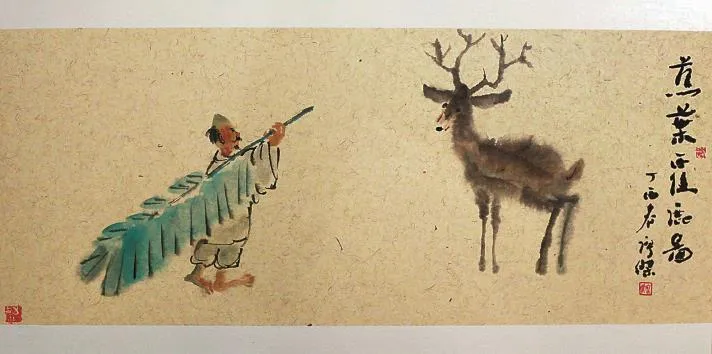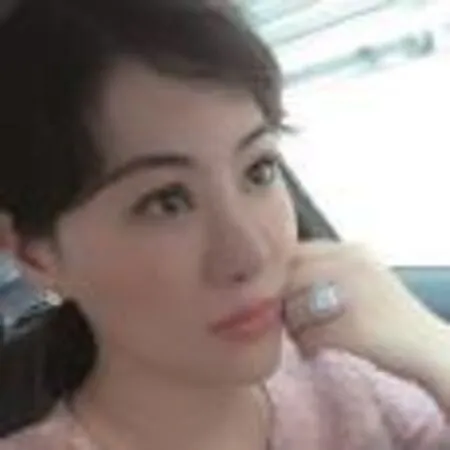The Deer Covered by Plantain Leaves
Text by Guo Dan Translation by Leo Illustration by Liao Jie
The Deer Covered by Plantain Leaves
Text by Guo Dan Translation by Leo Illustration by Liao Jie

Geese and deer are two species of animals that are frequently mentioned in A Dream of Red Mansions, one of the best-known classic novels in Chinese history. In Chapter 37, entitled “Begonia Club Takes Form One Day in the Studio of Autumn Freshness and Themes for Poems on Chrysanthemums Are Prepared One Evening in Alpinia Park”, Tanchuan proposed to start a poetry club. The following conversation occurred when they tried to choose pen names for themselves.
“I'll be Master of Autumn Freshness,” cried Tanchun. “There's something unreal and awkward about 'master' and 'scholar,'” objected Baoyu. “With all these wu-tung trees and plantains here, why not use them in your name?”
“Yes, I know what. I like plantains best so I'll call myself The Stranger Under the Plantain.” The others approved this as more original. Only Daiyu teased, “Drag her off, quick! Stew some slices of her flesh to go with our wine.” When the others looked mystifled, she explained with a smile, “Didn't an ancient say, ‘The deer was covered with theplantain'? If she calls herself The Stranger Under the Plantain, she must be a deer. Let's hurry up and cook this venison.” With this, the others burst into laughter.

Kallen Guo
Senior filmmaker, socialite and bestselling author, authored Don't Fall in Love with Zurich, the winner of The Best Foreign Language Novel.
郭丹
资深影视人、名媛、畅销书作家。代表作包括最佳外语小说奖获得作品《别爱苏黎世》等。
The allusion to the Stranger under the Plantain can be traced to a story found in King Mu of Zhou, a chapter in Liezi, a Taoist text attributed to an ancient Chinese philosopher by the name of Lie Yukou. The story goes that a man was collecting flrewood when he saw a deer limping his way. It was obviously injured, perhaps by a huntsman, he thought. He dashed forward and killed it using a pole. For fear of being found by the huntsman, the man hid the dead deer in a pit and covered it with plantain leaves before he continued his work nonchalantly. As darkness set in, the huntsman still did not show up, so the man made his mind to take home the deer, along with some flrewood. But he could no longer locate the pit where he had hidden the deer. “Perhaps I never saw such a deer, let alone covered it with plantain leaves. It must have been a dream” he thought to himself. From the story came the term “the deer covered by plantain leaves”, which generally refers to confusingly dreamy happenings or people.
The allusion in the novel may be a hint of Tanchuan's failed attempt, through a reform, to save the families collapsing. But who knows?
蕉叶覆鹿
《红楼梦》里遇到最多的动物,就是鹅和鹿。第四十九回《琉璃世界白雪红梅,脂粉香娃割腥啖膻》说的就是大观园一众美女和一个俊男张罗着吃烤鹿肉的事。
说起鹿,也是探春在诗社的别号。大家为自己的诗翁想名号时,探春笑道:“我就是‘秋爽居士’罢。”宝玉道:“居士、主人到底不恰,且又瘰赘。这里梧桐芭蕉尽有,或指梧桐芭蕉起个倒好。”探春笑道:“有了,我最喜芭蕉,就称‘蕉下客’罢。”众人都道别致有趣。黛玉笑道:“你们快牵了他去,炖了脯子吃酒。”众人不解。黛玉笑道:“古人曾云‘蕉叶覆鹿’。他自称‘蕉下客’可不是一只鹿了?快做了鹿脯来。”众人听了都笑起来。
蕉叶覆鹿这个典故见于《列子·周穆王》:“郑人有薪于野者,遇骇鹿,御而击之,毙之。恐人见之也,遽而藏诸隍中,覆之以蕉,不胜其喜。俄而遗其所藏之处,遂以为梦焉。顺途而咏其事,傍人有闻者,用其言而取之。”
有一个郑国人,一天在野外砍柴,忽见一只鹿慌忙地跑过来,受了一些伤,跑得不太快。这人乘机赶上去,一扁担将它打死了。他怕猎人追来发现,就把死鹿藏在一个洼坑里,上面“覆之以蕉”,藏好以后就若无其事地继续砍柴。天快黑了,并没有什么人来,他准备把死鹿连同砍得的柴一块挑回去。可是,这时他忘了藏死鹿的地方,找来找去,最后他想:“恐怕我根本并没有打到过什么鹿,也根本并没有把它藏在什么蕉叶下面,一定是我做了这么一个梦罢了!”由于这个故事,有人就把恍惚如梦的糊涂事儿,叫做“蕉鹿”。元代洪希文诗:“得非爱惑聪,戏我如蕉鹿。”
其实故事还有后续,说另一人梦中得鹿,是否预示探春的改革是一场稀里糊涂的事儿,就不得而知了。

